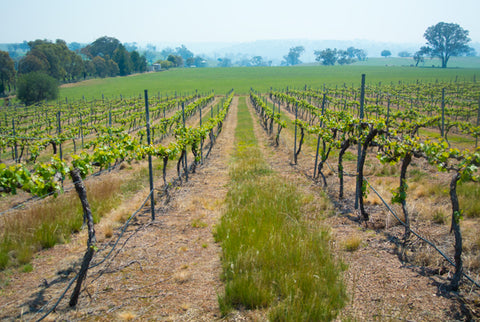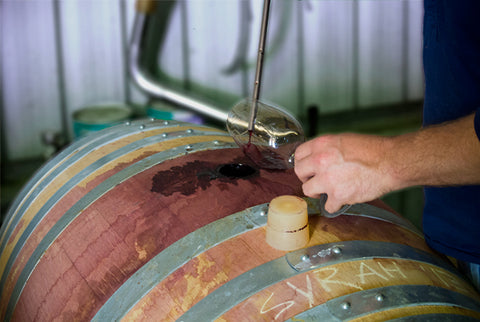 At Faisan, we believe great wine should be drinking well upon release. But that's not to say it should be a drink-early style, as that implies it has a limited lifespan, as great wine should also be able to improve significantly with age.
At Faisan, we believe great wine should be drinking well upon release. But that's not to say it should be a drink-early style, as that implies it has a limited lifespan, as great wine should also be able to improve significantly with age.
We all like to be able to enjoy our wine now, but many of us also like to be able to have the excitement and sense of accomplishment in cracking open a bottle thats done hard time in the cellar. It's achieving that balance which is not only the challenge, but our mission.
To achieve wine that's ready to drink now, you need to let the fruit do the talking. This is achieved by our vineyard's terrior. Soils made up largely of decomposed limestone and gravel provides good drainage and allows the fruit to naturally grow at small yields, which results in smaller berries with concentrated fruit flavour. The naturally cooler climate of the Orange wine region also allows the fruit to develop naturally vibrant aromatics.
These soils, assisted by the gradual ripening season allowed for by the cooler climate also imparts minerality and a strong acid spine. This builds tightness in the palate, which will gradually open up over time, allowing the flavour to continually evolve. This is the first step to creating an age-worthy wine, but this is a balancing act on several scales and what we do in the winery also has an influence.

For starters, our Chardonnay is fermented in a combination of both old and new French oak, while our Sauvignon Blanc sees only old oak. New oak not only imparts a beautiful wood character, it also tightens and intensifies the fruit flavour, allowing it be varietally expressive when young, but slowly unravel over an extended period also. When combined with the natural minerality and acid, a five year life span for our Chardonnay is conservative. As only old oak is used in the Sauvignon's ferment, no wood characters are imparted, the flavour is merely tightened and further intensified. Typically, Sauvignon Blanc is best drunk within 12 to 24 months, but due to the effect that the old oak has on the flavour, a 3 year minimum lifespan is expected, with the texture continuing to soften over this period.
As for our reds, both the Syrah (Shiraz) and Pinot Noir are whole bunch fermented, giving the wine extended contact with the stalks, which leads to the further extraction of stalk tannins. Tannins not only cause a mouth-drying sensation in red wine, but they also provide a tight-structural palate. As the wine ages, the tannins will soften and the more the flavour will unravel. While both wines are matured in a combination of both new and old French oak, we didn't want the lighter-bodied texture and delicate varietal characteristics of cooler climate Shiraz and Pinot Noir to be overwhelmed by oak flavour, so the support of a firm tannic structure is essential to giving these wines age-worthiness.

While both our Cabernet Franc and Cabernet Sauvignon aren't whole bunch fermented, they spend an extended maturation period (approximately 18 months) on both new and old French oak. Of all our wines, this is the longest maturation period used. The varietal flavours in both wines are bold enough to stand on their own, which allows them to drink well in their youth. The purpose of the oak; like our Chardonnay, is to tighten the palate and give the wines firmer fruit flavours. This extended maturation period leads to longer-term cellaring.
After the winery, yet another influence in the age-worthiness of our wines is the different types of bottle closure used. Since the arrival screw cap, wines are being sealed in a near air-tight enclosure. This is advantageous in one respect, as certain wines can have their lifespans more than double as a result. But, this can also lead to the disappointment of cracking open a seven year old Cabernet and finding that it's still as tight as it was when it was only twelve months old. Patience shouldn't take a lifetime to be rewarded, which is why we seal our Cabernets with DIAM instead of screw cap.
Under this DIAM cork closure alone, we expect our Cabernets to have a minimum 20 year lifespan. As we expect our other wines to have a more medium-term (5 to 10 years) cellaring potential, we feel that the air-tight environment that screw caps provide is ideal.

However, the potential lifespan of any wine is subjective. Our 1998 Pinot Noir was sealed under natural cork and that still drinks beautifully today.
Now for the final part, cellaring. The most important factor is temperature. A well-ventilated environment with a constant temperature of between 14 to 18 degrees celsius is ideal. Humidity is becoming less of an issue, due to screw cap closures, but seeing as our Cabernets are sealed with DIAM corks, it's important that humidity is around 70%, otherwise you risk the DIAM's drying and shrinking in size, which will result in the wines becoming oxidised. Keeping the your Cabernet bottles stored horizontally will also keep the DIAM's in constant contact with the wine, thus keeping them lubricated. For our other wines sealed under screw cap, this is less of an issue. Keeping your wines away from direct sunlight is also important, otherwise your wines can become light struck, which can result in them picking up smells like onions, cooked cabbage, and wet wool. Finally, storing your wines in an area free of vibration is a must. Constant vibrations can accelerate the ageing process of your wines. An under-cover garage (not shared, due to vibrations) or storage area can be ideal. Built-in wardrobes and stairwell cabinets can also be option, depending on the temperature of the surrounding premise. If such a location isn't available, wrapping your wine bottles in wrapping paper or newspaper, then storing in either cardboard or polystyrene boxes are other options. You can also purchase specialised wine storage cabinets, which are built to replicate an enclosed cellaring environment. Brands like Vintec are one example. Kennards Storage also offers on-premise wine cellars for hire.
But if in doubt, you can still drink our wine now. They're still good now, so we won't hold it against you...